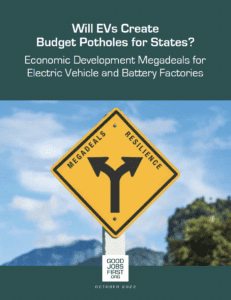Greg LeRoy [email protected]
Kasia Tarczynska [email protected]
States Commit Future Cash to Unproven Companies, Loose Deals
 Washington, D.C. — In a megadeal spending spree like no other in U.S. history, states and localities have awarded more than $13.8 billion in economic development subsidies to at least 51 electric vehicle (EV) and EV battery factories, mostly in recent years.
Washington, D.C. — In a megadeal spending spree like no other in U.S. history, states and localities have awarded more than $13.8 billion in economic development subsidies to at least 51 electric vehicle (EV) and EV battery factories, mostly in recent years.
That conservative tabulation omits at least 53 more projects for which subsidies have not yet been disclosed. And the costs of many of the 51 known deals are only partially known. Billions have gone to unproven companies, and six states have set all-time cost records for individual economic development projects.
These massive subsidies are unnecessary, because decades of federal and state investments and policies are driving a robust EV market surge. They amount to states taking credit for good news that is already unfolding.
Those are among the key findings in “Will EVs Create Budget Potholes for States?” a report issued today by the watchdog group Good Jobs First.
“We support EVs as a necessary and vital climate-change solution,” said Good Jobs First executive director Greg LeRoy, the report’s lead author. “But these megadeals are unnecessary. The dollars would be far better used making state economies more resilient to big changes coming to the auto supply chain and maintenance markets.”
Other key findings:
- Six states — Georgia, Kansas, Michigan, Nevada, North Carolina, and Tennessee — have already pledged more than $1 billion each to EV or EV-battery facilities.
- Georgia has awarded the two largest auto-subsidy packages in U.S. history — of any auto technology — totaling $3.3 billion, to Rivian and Hyundai.
- At least six states — Georgia, Kansas, Kentucky, Nevada, North Carolina, and Tennessee — have awarded their largest economic development megadeals in state history to EV/battery projects.
- Job quality and “downstream” ripple effects are at risk: Despite some history of foreign equity in unionized U.S. auto factories, and the unionized Big 3 (GM, Ford, Stellantis) moving into EV production, none of the foreign-based producers converting or building U.S. factories for EVs has a unionized workforce — nor do any pure-EV car start-ups such as Tesla, Lucid or Rivian.
- A growing number of electric bus manufacturers are unionized and some also have Community Benefits Agreements.
- If current site selection trends continue, the rise of EVs will cause more disinvestment of Midwestern states.
- “Upstream” ripple effects are also at risk because EVs are much simpler mechanically than internal-combustion cars. States need to proactively identify those at-risk factories, especially gasoline engine and transmission plants.
- Auto sales and maintenance jobs are also going to decline as EV companies push direct sales and EVs require much less maintenance.
The big picture is clear: Big-spending states are likely creating — and sometimes obscuring — future “budget potholes” of subsidy commitments to an industry that will soon be shedding factory, maintenance, and sales jobs.
And some of the deals do not themselves even guarantee good jobs or other economic development ripple effects:
- Kansas’s $1.27 billion subsidy package for Panasonic has no job-creation requirements, nor any wage or benefit rules.
- Georgia’s $1.48 billion deal for Rivian allows the company to pay as little as $20 an hour, with no employer support for healthcare or other benefits — through the year 2046.
By contrast, in electric bus manufacturing, three companies (Gillig, BYD Motors and Proterra) have unionized factories and the largest bus builder, New Flyer, has a Community Benefits Agreement covering its factories in Alabama and California. Such agreements can improve both job quality and domestic content rates.
States and localities are able to spend so lavishly in part because of the half-trillion dollars in flexible grants they have received under provisions of the Coronavirus Aid, Relief, and Economic Security (CARES) Act and the American Rescue Plan Act (ARPA).
“States should spend those pandemic dollars broadly to make their economies more resilient against future recessions, pandemics and to equip workers for the big coming changes in auto jobs,” said LeRoy. “These megadeals are too many eggs in very few baskets.”
The study concludes with a detailed menu of federal, state and local policy options to better direct economic development funding, given EV realities. They include subsidy caps, pro-active identification of factories at risk of closure, retooling and retraining, and the use of public procurement powers to improve job quality and hiring diversity.
Read the full report.
Founded in 1998, Good Jobs First is a DC-based non-profit, non-partisan policy resource center that promotes corporate and government accountability in economic development.